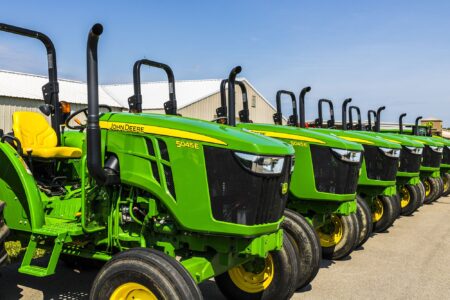By Ryan Hanrahan
The Washington Post’s Lauren Kaori Gurley reported that “the Trump administration said that its immigration crackdown is hurting farmers and risking higher food prices for Americans by cutting off agriculture’s labor supply.”
“The Labor Department warned in an obscure document filed with the Federal Register last week that ‘the near total cessation of the inflow of illegal aliens’ is threatening ‘the stability of domestic food production and prices for U.S. consumers,’” Gurley reported. “‘Unless the Department acts immediately to provide a source of stable and lawful labor, this threat will grow’ with increased funding for immigration enforcement from the One Big Beautiful Bill Act, the Labor Department said in the Federal Register, which is the place where all proposed rules are recorded for the public to view and comment.”
“Also, contradicting comments made by Agriculture Secretary Brooke Rollins that the U.S. farm workforce will become ‘100 percent American’ as an effect of mass deportations, the Labor Department noted that Americans are not willing to step into farm work and lack the skills to fill agricultural jobs that undocumented immigrants are abandoning,” Gurley reported. “‘The Department concludes that qualified and eligible U.S. workers will not make themselves available in sufficient numbers,’ the agency said.”
“The Labor Department made this case in paperwork documenting a new rule that took effect Oct. 2 that effectively lowers pay for seasonal migrants working in agriculture under the H-2A visa program,” Gurley reported. “The move is aimed at giving farmers easier and legal access to immigrant workers ‘to avoid imminent widespread disruption across the U.S. agricultural sector,’ the agency said.”
New H-2A Rule Could Save Employers Billions
Progressive Farmer’s Chris Clayton reported that “the wage changes in the interim final rule published in the Federal Register will save H-2A employers $2.46 billion per year. The rule affected roughly 22,000 farms that hire H-2A workers and approximately 371,000 or so immigrant workers, based on 2024 figures of H-2A employment.”
“While the federal government has shutdown, the Department of Labor was still able to publish the new interim final rule in the Federal Register. The rule lowers the Adverse Effect Wage Rate (AEWR) methodology for H-2A workers,” Clayton reported. “Under the changes, H-2A wages will drop between $1.12 to $3.18 an hour depending on the state. At least part of that downward adjustment in hourly wages is due to the Labor Department calculating housing costs for H-2A workers, which employers are not required to pay for domestic workers.”
“The lower wages will lead farmers to hire more H-2A workers. The Department of Labor estimates farmers will hire approximately 119,000 additional H-2A workers as a result,” Clayton reported. “The rule comes after Agriculture Secretary Brooke Rollins announced USDA would no longer produce the Farm Labor Survey, which farm groups had argued unfairly drove increases in wages. Instead, the Labor Department will rely on its Occupational Employment and Wage Statistics (OEWS) survey to generate annual analysis on H-2A wages going forward.”
What Immigration Experts Are Saying
Newsweek’s Dan Gooding reported that Stuart Anderson, executive director of the National Foundation for American Policy said that “while liberalizing some H-2A rules can help, farmers really want protections for workers who may not be authorized to work and industries, such as dairy, which can’t use H-2A visas, need even bigger fixes due to administration policies that have reduced the supply of available workers.”
Rebecca Shi, chief executive officer at the American Business Immigration Coalition, said “food security IS national security. Many of the farmers and agriculture industry leaders American Business Immigration Coalition (ABIC) works with have been saying this for months, as we call for urgent legal work permits for our essential workers, including on farms and in food processing facilities. Now, the Department of Labor itself is calling out the immediate dangers to our food supply from mass immigration enforcement, as well as the risk of food prices increasing. If the U.S. doesn’t have a stable workforce, we risk our food security AND our national security,” Gooding reported.
Gooding reported that Mark Krikorian, director of the Center for Immigration Studies said “I think the administration has been doing good work on immigration, but in this instance what they’re doing is reducing the incentive for farmers to move away from relying on cheap immigrant labor.”
Immigration Crackdown Hurting Ag, Labor Dept. Concedes was originally published by Farmdoc.


:max_bytes(150000):strip_icc()/Markets-8-Soybeans-up-corn-down-10-39d51bc414e3404d8a298ad3f60968ec.jpeg)




:max_bytes(150000):strip_icc()/47075387454_577e826006_o-af71ed3c08d8463c8580a9b189fa2e58.jpg)

:max_bytes(150000):strip_icc()/AJF_3019-scaled-1ade05d0d79743dab72e18aa87c15a25.jpg)
:max_bytes(150000):strip_icc()/Markets-7-Corn-up-soybeans-down-3-8a19ee3772234e24930af71711d04827.jpeg)

:max_bytes(150000):strip_icc()/IMG_2890-1536x1152-3e525ec1627340a18d71eca413e6e1d6.jpg)